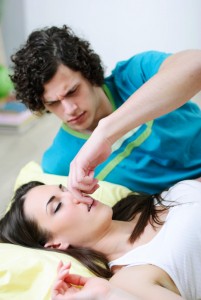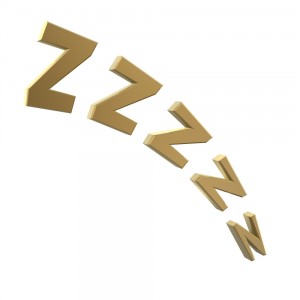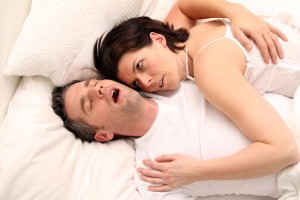 Sleep apnea is the cessation of breathing during sleep for at least 10 seconds at a time. There are two types of sleep apnea: central and obstructive. Central sleep apnea (CSA) is a disorder that causes the brain to stop sending the proper signals to the muscles that control breathing. The most common form of sleep apnea is obstructive sleep apnea (OSA). This form of apnea occurs when airways are blocked during sleep causing the cessation of breathing. Many patients are treated using Continuous Positive Airway Pressure (CPAP) that, as the name suggests, keeps airways open using a continual flow of air. Many CPAP users are unhappy with the system because the sounds it makes are loud, they can’t get used to the sensation of forced air, and because the CPAP system is inconvenient for travel. For patients who suffer from OSA, our Beachwood, OH dental team has an alternative to the CPAP system: oral appliance therapy with The Moses® and SomnoDent®.
Sleep apnea is the cessation of breathing during sleep for at least 10 seconds at a time. There are two types of sleep apnea: central and obstructive. Central sleep apnea (CSA) is a disorder that causes the brain to stop sending the proper signals to the muscles that control breathing. The most common form of sleep apnea is obstructive sleep apnea (OSA). This form of apnea occurs when airways are blocked during sleep causing the cessation of breathing. Many patients are treated using Continuous Positive Airway Pressure (CPAP) that, as the name suggests, keeps airways open using a continual flow of air. Many CPAP users are unhappy with the system because the sounds it makes are loud, they can’t get used to the sensation of forced air, and because the CPAP system is inconvenient for travel. For patients who suffer from OSA, our Beachwood, OH dental team has an alternative to the CPAP system: oral appliance therapy with The Moses® and SomnoDent®.
(more…)
Category: sleep apnea cleveland
The Alternative Sleep Apnea Treatment Beachwood Residents Prefer
November 18, 2015
Treating Sleep Apnea With Three Different Options
November 28, 2012
 Sleep apnea is a common issue with men and women, ranging in age from children to adults. If not treated properly with the right amount of examination and care, the effects can be fatal. Don’t let the early warning signs pass you or your loved ones by.
Sleep apnea is a common issue with men and women, ranging in age from children to adults. If not treated properly with the right amount of examination and care, the effects can be fatal. Don’t let the early warning signs pass you or your loved ones by.
With the modern technology found at the Center for Advanced Dentistry, Dr. Hornstein can help you treat it, no matter what your age is.
Basically, there are three main methods of treatment:
- Surgery
- Using a CPAP (Continuous Positive Airway Pressure) machine
- Wearing a custom fit oral appliance at night.
Surgery might sound a bit extreme at first, but if you have a blocked airway, surgery is highly recommended. With an obstructive sleep apnea (OSA), blockages somewhere in the airway occur repeatedly in a short amount of time. Your breathing can stop for as little as a few seconds to a few minutes. The hope with the surgery option is to open the airway. That way, you can reduce obstructions to a safe level. Your uvula, palate and jaw are looked at.
With a CPAP machine, oxygen is continuously pumped into your nose or a facial mask.
If you find a CPAP to be a ball and chain, there is another option. Oral appliance therapy involves an orthotic made with you in mind and you wear it at night. This orthotic can do all kinds of things, like preventing the soft palate from blocking your airways and repositioning your tongue. Even better, an oral appliance lessens snoring.
Dr. Hornstein and the Center for Advanced Dentistry are here to help. We’re happy to talk with you about what’s best for treating your sleep apnea. Give us a call today. We serve patients from Cleveland, Solon, Shaker Heights, Pepper Pike, and surrounding areas.
Sleep Apnea Treatment for Patients in the Cleveland Area
June 27, 2011
 If you snore at night or suffer from symptoms like irritability, difficulty concentrating, morning headaches, or daytime drowsiness, you may have sleep apnea.
If you snore at night or suffer from symptoms like irritability, difficulty concentrating, morning headaches, or daytime drowsiness, you may have sleep apnea.
An under-diagnosed condition, sleep apnea can disrupt your (and your partner’s) sleep and have a detrimental effect on your overall health, putting you at risk for a wide spectrum of serious conditions ranging from heart attack to stroke, high blood pressure, heartburn, depression, and even memory loss.
It Can Take Your Breath Away-Forever
June 21, 2010
Snoring…Sleep Apnea… High Blood Pressure…Heartburn…Stroke…Heart Attack…Death. There is a statistical corralation between sleep apnea and heart attack. A person has 7 times the normal risk for heart attack if they are overweight, 7.8 times higher with hypertension, 11 times higher with smoking and a 23.3 times higher chance of having a heart attack if you have sleep apnea. Apnea means “without breath”. If you do not breathe for a period of 10 seconds, this is defined as “apnea” or an apneic episode. If you average 5-15 of these episodes in an hour of sleep, you are diagnosed with “mild” sleep apnea. 16-30 episodes per hour is moderate sleep apnea and over 30 episodes is considered severe. The average age of death for a person that has untreated sleep apnea is 55. Think of all the famous people who died in their sleep. You do not have to snore to also have sleep apnea. Taking this simple test can help determine your risk for sleep apnea. If you score higher than 10, then call our office for a consultation. Your life may depend upon it.
Sitting and Reading ______
Watching television ______
For more information, visit https://www.cfad.net/sleep-apnea-treatment.html .
Sleep Apnea Now Treated At CFAD
January 27, 2010
You may think of snoring as a mild nuisance, but it can actually be indicative of a sleep-breathing disorder known as sleep apnea. Snoring occurs when soft tissues block air passages. Air forces entry, causing the muffled vibrations we know simply as snoring. A variety of factors can contribute to airway blockage, including tongue and jaw position, throat size, and tonsil or adenoid size. Snoring does not necessarily indicate sleep apnea, and many patients who snore do not have sleep apnea.
Sleep apnea occurs when the airways are blocked to the extent that the person stops breathing at intervals of ten seconds or longer. The continual oxygen deprivation prevents the person from receiving a restful night’s sleep, because he or she must awaken enough to breathe. If left untreated, sleep apnea can lead to:
- Heart attack
- Stroke
- High blood pressure
- Acid Reflux
- Heartburn
- Depression
- Memory loss
Symptoms of Sleep Apnea
If you snore, gasp for breath at night, or sleep restlessly, you may have sleep apnea. Other signs include dry mouth, dizziness, inability to concentrate, morning headaches, irritability, and falling asleep when driving, reading, or sitting quietly. A sleep study will help Dr. Hornstein determine if you suffer from sleep apnea. You can also take an online risk assessment at www.mysleeptest.com, which is a brief questionnaire that assesses your risk level.
You may think of snoring as a mild nuisance, but it can actually be indicative of a sleep-breathing disorder known as sleep apnea. Snoring occurs when soft tissues block air passages. Air forces entry, causing the muffled vibrations we know simply as snoring. A variety of factors can contribute to airway blockage, including tongue and jaw position, throat size, and tonsil or adenoid size. Snoring does not necessarily indicate sleep apnea, and many patients who snore do not have sleep apnea.
Sleep apnea occurs when the airways are blocked to the extent that the person stops breathing at intervals of ten seconds or longer. The continual oxygen deprivation prevents the person from receiving a restful night’s sleep, because he or she must awaken enough to breathe. If left untreated, sleep apnea can lead to:
- Heart attack
- Stroke
- High blood pressure
- Acid Reflux
- Heartburn
- Depression
- Memory loss
Symptoms of Sleep Apnea
If you snore, gasp for breath at night, or sleep restlessly, you may have sleep apnea. Other signs include dry mouth, dizziness, inability to concentrate, morning headaches, irritability, and falling asleep when driving, reading, or sitting quietly. A sleep study will help Dr. Hornstein determine if you suffer from sleep apnea. You can also take an online risk assessment at www.mysleeptest.com, which is a brief questionnaire that assesses your risk level.
Treatment
Three methods of treatment include surgery, using a CPAP (Continuous Positive Airway Pressure), and wearing a custom fit oral appliance at night.
One option is surgery for those patients who have a blocked airway. With obstructive sleep apnea (OSA), blockages somewhere in the airway occur repeatedly and cause breathing to stop for at least ten seconds and maybe for a minute or longer. The intention of surgery is to open the airway sufficiently to eliminate or to reduce obstructions to a clinically insignificant level. In order to do so, surgical therapy in adults often must reconstruct the soft tissues (such as the uvula and the palate) or the bony tissues (the jaw) of the throat. This method has about a 50% success rate.
The most common method of treatment for sleep apnea involves a CPAP machine, which delivers a continuous stream of oxygen via nose and/or facial mask. While effective, the CPAP often proves cumbersome, and many patients find CPAP therapy intolerable and discontinue use.
In many cases, Dr. Hornstein can provide CPAP intolerant patients with an alternative. Oral appliance therapy involves a custom-made orthotic worn at night. Depending on your needs, the orthotic can reposition the tongue, hold the jaw forward, and prevent the soft palate from blocking the airways. An oral appliance also alleviates snoring. Dr. Hornstein will consult with you to determine which kind of oral appliance is right for you.
